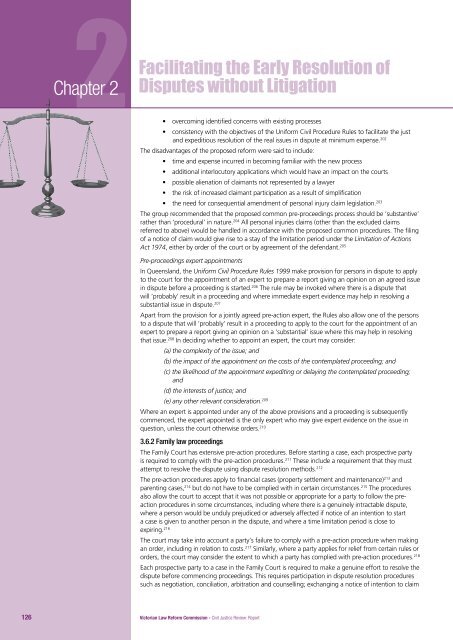Facilitating the Early Resolution of Disputes without Litigation
Facilitating the Early Resolution of Disputes without Litigation
Facilitating the Early Resolution of Disputes without Litigation
You also want an ePaper? Increase the reach of your titles
YUMPU automatically turns print PDFs into web optimized ePapers that Google loves.
Chapter 2<strong>Facilitating</strong> <strong>the</strong> <strong>Early</strong> <strong>Resolution</strong> <strong>of</strong><strong>Disputes</strong> <strong>without</strong> <strong>Litigation</strong>• overcoming identified concerns with existing processes• consistency with <strong>the</strong> objectives <strong>of</strong> <strong>the</strong> Uniform Civil Procedure Rules to facilitate <strong>the</strong> justand expeditious resolution <strong>of</strong> <strong>the</strong> real issues in dispute at minimum expense. 202The disadvantages <strong>of</strong> <strong>the</strong> proposed reform were said to include:• time and expense incurred in becoming familiar with <strong>the</strong> new process• additional interlocutory applications which would have an impact on <strong>the</strong> courts• possible alienation <strong>of</strong> claimants not represented by a lawyer• <strong>the</strong> risk <strong>of</strong> increased claimant participation as a result <strong>of</strong> simplification203• <strong>the</strong> need for consequential amendment <strong>of</strong> personal injury claim legislation.The group recommended that <strong>the</strong> proposed common pre-proceedings process should be ‘substantive’ra<strong>the</strong>r than ‘procedural’ in nature. 204 All personal injuries claims (o<strong>the</strong>r than <strong>the</strong> excluded claimsreferred to above) would be handled in accordance with <strong>the</strong> proposed common procedures. The filing<strong>of</strong> a notice <strong>of</strong> claim would give rise to a stay <strong>of</strong> <strong>the</strong> limitation period under <strong>the</strong> Limitation <strong>of</strong> ActionsAct 1974, ei<strong>the</strong>r by order <strong>of</strong> <strong>the</strong> court or by agreement <strong>of</strong> <strong>the</strong> defendant. 205Pre-proceedings expert appointmentsIn Queensland, <strong>the</strong> Uniform Civil Procedure Rules 1999 make provision for persons in dispute to applyto <strong>the</strong> court for <strong>the</strong> appointment <strong>of</strong> an expert to prepare a report giving an opinion on an agreed issuein dispute before a proceeding is started. 206 The rule may be invoked where <strong>the</strong>re is a dispute thatwill ‘probably’ result in a proceeding and where immediate expert evidence may help in resolving asubstantial issue in dispute. 207Apart from <strong>the</strong> provision for a jointly agreed pre-action expert, <strong>the</strong> Rules also allow one <strong>of</strong> <strong>the</strong> personsto a dispute that will ‘probably’ result in a proceeding to apply to <strong>the</strong> court for <strong>the</strong> appointment <strong>of</strong> anexpert to prepare a report giving an opinion on a ‘substantial’ issue where this may help in resolvingthat issue. 208 In deciding whe<strong>the</strong>r to appoint an expert, <strong>the</strong> court may consider:(a) <strong>the</strong> complexity <strong>of</strong> <strong>the</strong> issue; and(b) <strong>the</strong> impact <strong>of</strong> <strong>the</strong> appointment on <strong>the</strong> costs <strong>of</strong> <strong>the</strong> contemplated proceeding; and(c) <strong>the</strong> likelihood <strong>of</strong> <strong>the</strong> appointment expediting or delaying <strong>the</strong> contemplated proceeding;and(d) <strong>the</strong> interests <strong>of</strong> justice; and(e) any o<strong>the</strong>r relevant consideration. 209Where an expert is appointed under any <strong>of</strong> <strong>the</strong> above provisions and a proceeding is subsequentlycommenced, <strong>the</strong> expert appointed is <strong>the</strong> only expert who may give expert evidence on <strong>the</strong> issue inquestion, unless <strong>the</strong> court o<strong>the</strong>rwise orders. 2103.6.2 Family law proceedingsThe Family Court has extensive pre-action procedures. Before starting a case, each prospective partyis required to comply with <strong>the</strong> pre-action procedures. 211 These include a requirement that <strong>the</strong>y mustattempt to resolve <strong>the</strong> dispute using dispute resolution methods. 212The pre-action procedures apply to financial cases (property settlement and maintenance) 213 andparenting cases, 214 but do not have to be complied with in certain circumstances. 215 The proceduresalso allow <strong>the</strong> court to accept that it was not possible or appropriate for a party to follow <strong>the</strong> preactionprocedures in some circumstances, including where <strong>the</strong>re is a genuinely intractable dispute,where a person would be unduly prejudiced or adversely affected if notice <strong>of</strong> an intention to starta case is given to ano<strong>the</strong>r person in <strong>the</strong> dispute, and where a time limitation period is close toexpiring. 216The court may take into account a party’s failure to comply with a pre-action procedure when makingan order, including in relation to costs. 217 Similarly, where a party applies for relief from certain rules ororders, <strong>the</strong> court may consider <strong>the</strong> extent to which a party has complied with pre-action procedures. 218Each prospective party to a case in <strong>the</strong> Family Court is required to make a genuine effort to resolve <strong>the</strong>dispute before commencing proceedings. This requires participation in dispute resolution proceduressuch as negotiation, conciliation, arbitration and counselling; exchanging a notice <strong>of</strong> intention to claim126Victorian Law Reform Commission - Civil Justice Review: Report
















